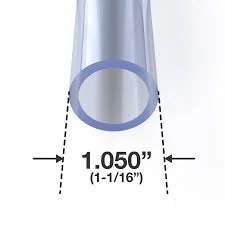Nov . 24, 2024 15:48 Back to list
Exploring the Benefits of HDPE Sprinkler Pipe for Efficient Irrigation Systems
The Advantages of HDPE Sprinkler Pipes in Irrigation Systems
In the realm of modern agriculture, efficient water management is paramount to improving crop yield and sustainability. One of the most innovative solutions in irrigation technology is the use of HDPE (High-Density Polyethylene) sprinkler pipes. These pipes have gained popularity due to their unique properties and benefits. This article explores the advantages of HDPE sprinkler pipes, their applications, and their impact on agricultural practices.
What is HDPE?
High-Density Polyethylene (HDPE) is a thermoplastic polymer made from petroleum. It is known for its high strength-to-density ratio, making it ideal for a wide range of applications, including packaging, plastic bottles, and, importantly, pipes. HDPE pipes are commonly utilized in irrigation systems due to their resilience, flexibility, and cost-effectiveness.
Advantages of HDPE Sprinkler Pipes
1. Durability One of the standout features of HDPE pipes is their remarkable durability. They are resistant to corrosion, rust, and chemical exposure, which ensures a long lifespan even when used in harsh environmental conditions. This is especially crucial in agricultural settings where pipes are exposed to various chemicals, fertilizers, and minerals.
2. Flexibility HDPE sprinkler pipes are highly flexible, allowing for easier installation and adjustments on the field. This flexibility makes it easier to navigate around obstacles and create custom layouts for irrigation systems. The adaptability of these pipes helps farmers optimize water distribution, leading to more efficient irrigation practices.
3. Lightweight and Easy to Handle Compared to traditional metal pipes, HDPE pipes are significantly lighter, which reduces transportation costs and makes them easier to handle during installation. This characteristic is particularly advantageous for large-scale irrigation projects, where moving heavy materials can be a significant logistical hurdle.
hdpe sprinkler pipe

4. Resistance to Environmental Stress HDPE pipes exhibit excellent performance in challenging environmental conditions such as extreme temperatures and UV exposure. They are less likely to crack or fail under stressful conditions, ensuring reliable water delivery throughout the growing season.
5. Cost-Effectiveness While the initial investment in HDPE pipes may be higher than traditional materials, the long-term savings in maintenance and replacement costs make them a cost-effective choice. Their durability reduces the frequency of repairs, and their efficiency in water usage can lower overall irrigation costs.
6. Reduced Friction Loss The smooth interior surface of HDPE pipes minimizes friction loss, which enhances the efficiency of water flow. This results in better water distribution across the irrigation system, ensuring that crops receive the necessary moisture without wastage.
7. Environmental Sustainability As concerns over water scarcity and sustainable practices grow, HDPE pipes offer an eco-friendly option for irrigation. They are recyclable and can be reused or repurposed, reducing the environmental impact of plastic waste. Furthermore, their efficiency in water delivery contributes to responsible water use in agriculture.
Applications in Agriculture
HDPE sprinkler pipes are versatile enough to be used in various agricultural applications. They are ideal for agricultural fields, vineyards, orchards, and greenhouses where precise water delivery is essential. Moreover, they can accommodate different irrigation systems, including drip irrigation and overhead sprinklers, making them a flexible solution for various farming needs.
Conclusion
The use of HDPE sprinkler pipes in irrigation systems represents a significant advancement in agricultural technology. Their durability, flexibility, and cost-effectiveness make them an essential tool for modern farmers seeking to optimize water usage and improve crop yield. As the agricultural industry continues to evolve, embracing innovative solutions like HDPE pipes is crucial for promoting sustainable practices and ensuring food security in a changing environment. By adopting HDPE technology, farmers can contribute to a more efficient, sustainable, and productive agricultural future.
-
Durable PP Rigid Sheet: Lightweight, Chemical Resistant Solutions
NewsAug.21,2025
-
PVC Grey Sheet for Extraction: Chemical Resistant & Durable
NewsAug.19,2025
-
Durable PVC Pipe Fittings for Plumbing & Irrigation Needs
NewsAug.18,2025
-
HDPE Steel Belt Reinforced Spiral Corrugated Pipe | High Strength
NewsAug.17,2025
-
HDPE Pipe Fittings: Durable, Leak-Proof Solutions
NewsAug.16,2025
-
Premium CPVC Sheet: High-Temp & Chemical Resistant Solutions
NewsAug.15,2025

